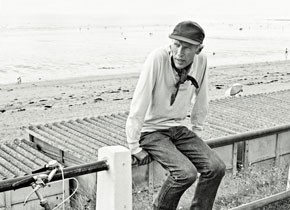Eric Rohmer
October 7 to November 4, 2010
Eric Rohmer, who died in January 2010, was a central figure of the French New Wave. At the same time he developed an aesthetic that remains sui generis: Rohmer’s signature style combines naturalistic, deceptively simple everyday narratives with artfully composed, intellectually enticing experiments in human behavior. Before coming to cinema, Rohmer was passionately involved with literature, classical music and philosophy – disciplines that permeated and illuminated Rohmer’s work to the very end. His films revolve around the dialectic of thought and feeling and embrace this paradox – the restrained comic collision between rationalism and eroticism, between longing gestures and idées fixes, and between well-established worldviews and unforeseen coincidences.
Rohmer’s vision extends to the tiniest capillaries of his work, even as he develops his themes as broadly as possible. In several large film cycles, Rohmer found the ideal expression for his project. His enigmatic statement about the first cycle, “Moral Tales,” (1963-72) is typical: “What I call a conte moral is not a tale with a moral, but a story that deals less with what people do than with what is going on in their minds while they are doing it. A cinema of thoughts rather than actions.”
In the documentary portrait of the director, Preuves à l'appui, Rohmer is called “a man without a biography,” and he consistently remained silent about his private life. Born in 1920 as Maurice Schérer, he borrowed his pseudonym equally from Erich von Stroheim and the creator of “Fu Manchu”, Sax Rohmer. As was the case with his colleagues at Cahiers du cinéma, where he was editor-in-chief from 1957-63, Rohmer’s path to directing began with the making of short films and film criticism (with Claude Chabrol he co-wrote the first study on Hitchcock, which characteristically focused on Hitchcock’s Catholicism).
What is considered “typically French” in Rohmer’s work may well be the result of a misunderstanding: his vision of cinema is deeply inspired by international film artists (notably, F.W. Murnau, whose Faust was the subject of Rohmer’s dissertation.) Also, Rohmer’s screenplays are fed by Greco-Roman, English and German traditions, as well as the French. His first historical film, Die Marquise von O ... (1976) was filmed in the original German of Kleist’s novel, a language that Rohmer himself had perfectly mastered.
His international breakthrough arrived with Ma nuit chez Maud (1969), a flawless demonstration of his exquisite form of communication: a sublime comedy of dialectics (and dialogue) spun around the resistance of a devout Catholic against the temptations of a divorced atheist. Rohmer’s “modern classicism” creates a delicate balance between speech and sound, gesture and image, which he continued to refine in the subsequent cycles, “Comedies and Proverbs” (1981-87) and “Tales of the Four Seasons” (1990-98) as well as in several intervening films.
The gesture of improvisation, as if the films were “eavesdropping on real life,” is only one (virtuosic) facet of his style: when Rohmer, in one of his finest films, Le Rayon vert (1986), actually allowed improvisation, the dialogue sounded exactly like in his scripted films. Elsewhere, excursions into areas such as suspense (La Collectionneuse), science-fiction (L’Amour l'après-midi) or painting à la Matisse and cartoons (Pauline à la plage) betray the inconspicuous mutability of Rohmer’s distinctive style.
The innermost (and smallest) group of Rohmer’s works are the historical films, which stand out distinctly from the summery images with which he is commonly associated. In these films the essence of his worldview is illuminated most sharply, and nowhere as clearly as in his minimalist magnum opus, Perceval le Gallois (1978) – in a sense, Rohmer’s work is a retelling again and again, and then again with different shadings, of the search for the Holy Grail.
Several Rohmer collaborators such as the actresses Béatrice Romand and Marie Rivière and editor-filmmaker Jackie Raynal will attend the retrospective. An accompanying publication, edited by Astrid Ofner and the Viennale, will present a wide variety of essays, interviews and documents as well as extended notes on all of Rohmer’s films.
The retrospective is a joint project of the Viennale and the Austrian Film Museum. Presented with kind support from Culturesfrance, the Institut Français de Vienne and Les Films du Losange.
Related materials
Link Viennale
